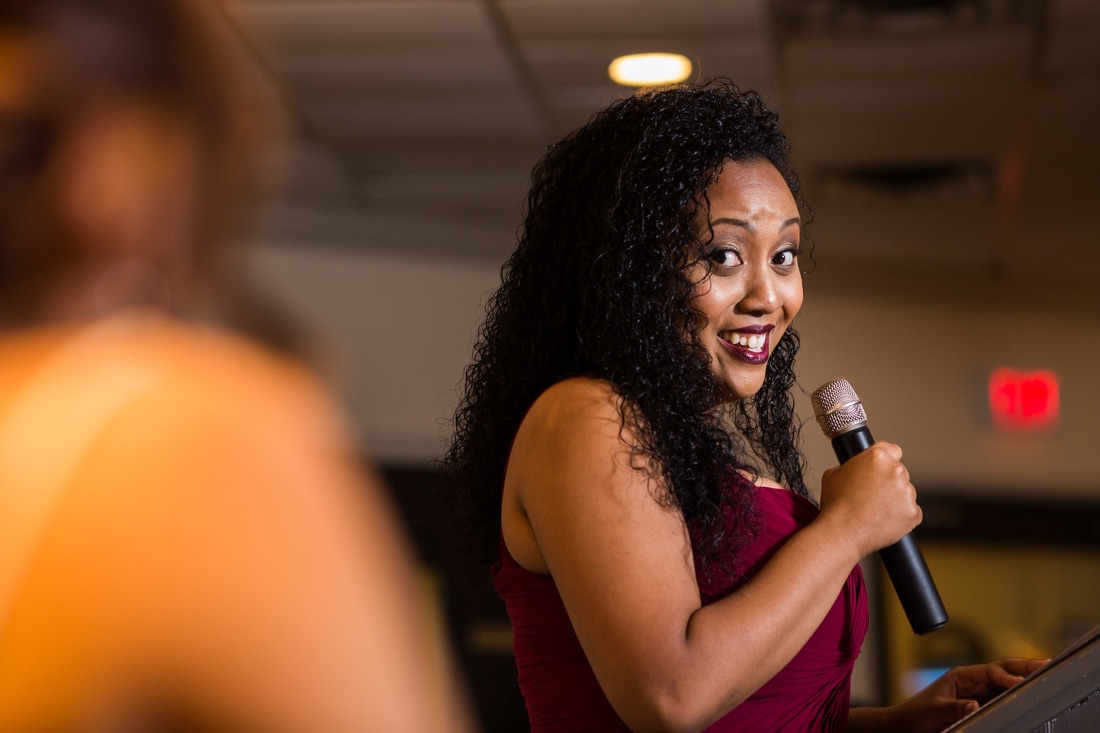The wedding party and the DJ put together such a spectacle that got everyone energized after the cocktail hour. The bride and groom’s entry was equally as fun, ending with a touching first dance with them singing to each other and literally dancing serenely as if no one were watching. The next hour would be the most challenging of the whole engagement process: sitting through a series of speeches similar to a Netflix marathon, but without fast forward button, with a fraction of the engagement and definitely with no chill.
I’ve wanted to write this series on preparing a good line-up of speeches for your wedding (or event) for some time now. With my attendance at tens of weddings and having to relive them ALL through the editing process, I’d love to offer some insights for making your speeches a fertile oasis in the program instead of “something to kill time with during dinner”.
I was tempted to do a little background research for this article into the origin of wedding speeches. Let’s face it, they’ve been done as far back as we can remember and it just seems so automatic that we should volunteer a few members of the wedding party and our family as tributes before the crowd. But I ditched the background research and decision to share my observations from a point of expertise.
Speeches can bring everyone together
Think about it: This, for some couples, will be one of the few times that people from almost every stage of your life will be together in one room: childhood friends, co-workers, schoolmates, teammates, members of the community, family, and those cousins that you only see at major family milestones. All these groups of people are strangers to one another and they only have a fragment of your (the couple’s in the case of a wedding) story. Speeches can help to put everyone on the same page. A well told story can quiet any group of people and bring them together, even if it’s just for its duration.
Speeches can help break the ice
Lots of these groups of people are going to be sharing a table with each other. We often overlook the vulnerability involved in eating with a stranger and now these people, after anxiously investigating the table chart, realize that they’re sitting with people who’s names they don’t know how to pronounce. After laughing at a few jokes at the couple’s expense and seeing how their parts of the puzzle tie in to the complete picture of the couple, it’s now easier to look across the table and smile at each other. They now have more common ground and possibly an “inside joke”.
Choose a seat not a side
we’re all family once the knot is tied
Given these possibilities, here are some things to consider as you choose victims… I mean volunteers for your speeches:
1) Confidence is important
- A confident person doesn’t necessarily have to be loud and charismatic. Confidence is really just sureness in one’s self and actions, and that can be equally present in your loud and quiet friends and family. Most importantly, people are naturally attracted to confidence.
2) Humour is a great asset
- Remember that humour is one of the easiest ways to break the ice. In some cases, your friends are arriving to the wedding acquainted to no one else but their date for the evening. Also, it keeps your audience engaged and minimizes that dull roar of chatter that could happen during uninteresting moments at the podium.

3) Acquaintance with the details of the couples relationship is a must
- Speeches are essentially story time for everyone. I kid you not! The more revelatory the stories, the more engaged your audience will be. Unfortunately, I’ve been to weddings where random family members who don’t know much about the details of the couple’s relationship have come up to say their congrats and to give wedding advice in front of everyone (in spite of the officiant already doing that in the ceremony). Because of how that is received, I believe that can be done on the side and is not beneficial to everyone.
4) Think outside the box
- The standard formula for choosing the presenters is the following: bridesmaid(s), groomsman(men), maid or honour, best man, parents of the bride, parents of the groom, and finally the newly weds. Let me blow your mind for a moment: you don’t have to have that configuration in your roster. What if the best man doesn’t even speak English (or whatever language the wedding is done in) well? What if the maid of honour is not confident and absolutely hates public speaking? I’ve been in situations where friends who were not in the wedding party gave great speeches. I’ve been to weddings were the parents didn’t speak or only one did. In those situations, everything was fine! I will say though: as a gesture of respect, it’s a good idea to offer parents an opportunity to say a few words (in most cases).
5) Willingness will get you a long way
- Don’t obligate people to do a speech. Public speaking is the greatest fear among people, even topping things like, you know, death, terminal illness and even unhappiness. Appeal to the people you think would be great storytellers and have them decide. Willingness is the difference between a person begrudgingly throwing some thoughts together on the day of the wedding, and a person with little experience taking the time to research, practise and refine a well thought-out speech.
6) Not too many
- I hate to give out hard and fast rules for things as subjective as this but, if you twisted my arm, I would say maximum 6 speeches. This number includes the parents’ speeches and the thank-you speech from the newly-weds. This is definitely one of those situations were less is more. Typically couples allot 5 minutes for each speech while telling their speakers they have 2-3 minutes and what happens? The typical speech ends up being 10 minutes. Now multiply that by 6. You get the picture. There’s nothing wrong with finishing the speeches early if people actually stick to the time (but no bets!).
I hope these thoughts inspire you in your decision-making process. You might be lamenting another thing on your list to think about but it’s totally worth the thought. I’ve been at weddings where all the speeches were so engaging and the vibe in the room was so much less awkward than it could have been. Plus, you get a way better wedding film because of it!
If you think I missed anything or have further questions, please leave a comment or reach out. If you know someone planning their wedding and hashing through their reception timeline, be a friend and send them this article. In the next post in this series, I’ll be talking about do’s and don’t in a wedding speech. After all, just because you choose the right people, it doesn’t mean they’ll know what to say 😉
As we narrate together!
P.S. – To read about what you could say in the speech, click here for part 2

Comments